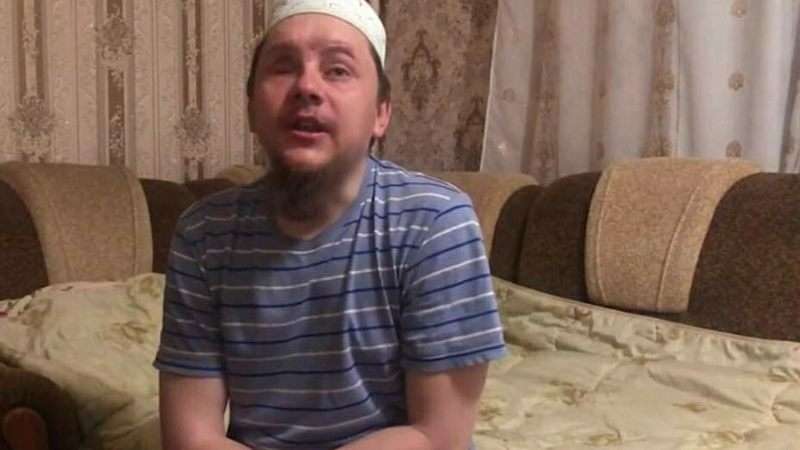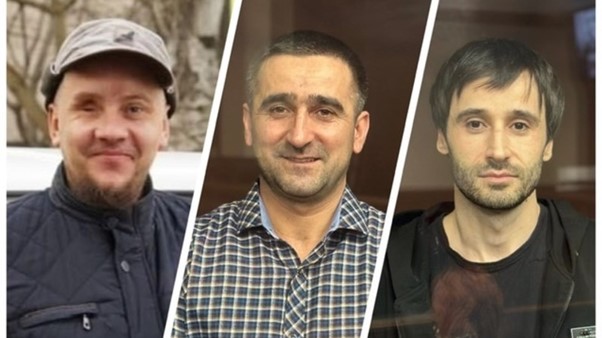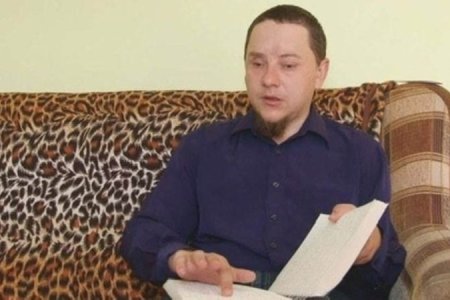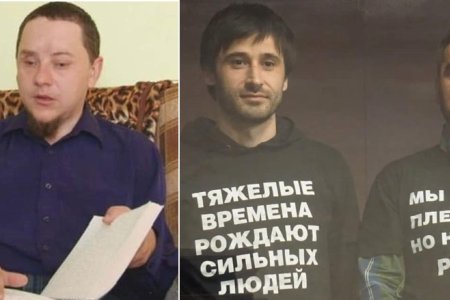
Four months after Crimean political prisoner Oleksandr Sizikov was taken by force to a prison in Siberia, Russia’s prison service has itself filed an application for his release. It remains to be seen whether being blind and unable to move about without assistance will finally be recognized as reason enough for ending Oleksandr’s specifically Russian form of torture. It did not stop the Russian FSB from arresting the Ukrainian Muslim, nor two Russian ‘courts’ from rubberstamping a monstrous 17-year sentence against him on absurd ‘terrorism’ charges.
Crimean Solidarity has learned from Oleksandr’s mother, Olena Sizikova, and his lawyer that the application for his release from imprisonment is to be heard by the Minusinsk district court in the Krasnoyarsk region, although no date for the first hearing has yet to be fixed. The lawyer assumes that the application was lodged by the management of the Minusinsk prison, where Russia is holding Oleksandr and where several prominent Ukrainian political prisoners have recently been imprisoned, including Crimean Tatar Mejlis leader, journalist and rights activist Nariman Dzhelyal and Crimean Solidarity civic journalist Osman Arifmemetov.
Olena Sizikova reports that her son underwent a medical examination at the Krasnoyarsk tuberculosis hospital No. 1, but was then, just 15 days later, returned to prison in Minusinsk. The medical examination confirmed that Sizikov is totally blind and is also suffering from third stage (or severe) hypertension.
The doctors who carried out the full medical recommended that Sizikov be released as his main condition, total blindness, is on the list of conditions precluding imprisonment.
Sizikov is the only Ukrainian political prisoner who is totally blind, but by no means the only one who has conditions on Russia’s list of those which should preclude imprisonment. It is therefore to be hoped that he will be released, but not necessarily guaranteed, with Russian ‘judges’ passing those rulings they know to be demanded of them.
One of the reasons for concern here is precisely the detail that made Sizikov’s trial so grotesque. Not only had the FSB targeted a person who was blind and restricted in his movements, but they were seriously claiming that he had acted as ‘organizer’ of a supposed ‘terrorist cell’. Oleksandr Sizikov (b. 1984); Seiran Khairedinov (b. 1988) and Akim Sufianov (b. 1990) were among seven Crimeans arrested after armed ‘searches’ on 7 July 2020. The men were all charged under Russia’s ‘terrorism’ legislation, although they were accused solely of ‘involvement’ in the peaceful transnational Hizb ut-Tahrir Muslim organization which is legal in Ukraine. Russia’s supreme court declared it a ‘terrorist organization’ in 2003, without providing an explanation and having kept it secret until it was too late to lodge an appeal. The FSB in occupied Crimea began arresting Ukrainian citizens, the vast majority of them Crimean Tatars, on these charges in 2015, and has been using them as a weapon against civic journalists and activists, especially those involved in the Crimean Solidarity human rights movement ever since. The same is true here, with all three men having spoken out in defence of victims of Russian repression. Lawyer Emil Kurbedinov suggested in October 2020 that Sizikov’s arrest was the FSB’s revenge for many occasions when Sizikov had expressed his outrage at the armed searches they were carrying out and the political trials underway. “There is no other way to explain the persecution of a totally blind person who has not committed any crime”.
The FSB invariably designate at least one person as ‘organizer’ of a supposed ‘Hizb ut-Tahrir group’ under Article 205.5 § 1 of Russia’s criminal code), with the others accused of ‘involvement’ in such an unproven ‘group’ (under Article 205.5 § 2). In this case, they had decided to designate Sizikov as the purported ‘organizer’, with this invariably resulting in a longer sentence than those accused of ‘involvement’. The prosecution asserted that Sizikov had organized a group which “carried out covert anti-constitutional activities through exerting influence on people’s religious feelings; organized and carried out meetings of the group, so-called ‘khalakaty’; looked for new participants and circulated the ideas”.

It is not only the lack of any recognizable crime that makes all these cases so flawed. No proof of actual involvement in Hizb ut-Tahrir is even required, as the FSB use illicitly taped conversations which they then send to FSB-loyal ‘experts’ who oblige by claiming that this or that word or sentiment indicates such involvement. Such fabricated ‘evidence’ is then supplemented by ‘secret witnesses’ who may never have met the defendants and whose testimony cannot be verified. This was one of numerous occasions where the FSB used a supposed ‘anonymous witness’ whose identity has, in fact, long been known, as have his reasons for collaborating with the FSB. Konstantin Tumarevich is a fugitive from justice in his native Latvia, and his vulnerable legal position in occupied Crimea and lack of documents provided the FSB with clear leverage against him. He has thus far been used to provide ‘anonymous witness’ testimony against at least 20 recognized political prisoners.
During the armed ‘searches’ that accompany the arrests, the FSB have never pretended to be looking for anything except so-called ‘prohibited religious literature’. Over recent years, they have dropped any pretence at all, and regularly bring the ‘prohibited literature’ that they then claim to have ‘found’. That is why they invariably prevent lawyers from being present. The families of Khairedinov and Sufianov stated from the outset that the armed and masked men who burst into their homes on 7 July 2020 had planted ‘prohibited books’. It later became clear that they had done so in Sizikov’s case as well but left books that were not in Braille, and which Sizikov could therefore not have read.
Sizikov, who turned 40 in October 2024, converted to Islam in 2006. A year later, he sustained catastrophic head injuries when his bicycle was hit by a car. He was blinded and also left unable to walk without assistance. At least one hearing had needed to be postponed because Sizikov had been hospitalized in a neurological ward, with the acute headaches and other symptoms he suffered probably the result of his accident. Similar delays occurred also during the appeal hearings.
Khairedinov and Sufianov have both been in Russian captivity since 7 July 2020. Sizikov, however, was one of a very small number of Crimeans arrested on ‘Hizb ut-Tahrir charges’ who were placed under total house arrest because of their condition.
Despite Sizikov’s condition, the Russian prosecutor Sergei Aidinov tried on several occasions to get Sizikov placed in detention before the sentences were passed amd then demanded an 18-year sentence. Although the Southern District Military Court had consistently rejected Aidinov’s applications for Sizikov to be imprisoned, on 17 May 2023, ‘judges’ Kirill Krivtsov (presiding), together with Alexei Magomadov and Sergei Yarosh found all three men ‘guilty’ both of the charges under Article 205.5 and of the additional and no less insane charge under Article 278 of ‘planning to violently seize power’.
Sizikov was sentenced to 17 years maximum-security [literally “harsh-regime”] imprisonment, with the first four years in a prison, the worst of all Russian penal institutions. The ‘court’ also added a further 18 months restricted liberty sentence at the end of the term of imprisonment. Khairedinov and Sufianov were each sentenced to 12 years, also with the first four years in a prison. In their cases, the term of restricted liberty after the main sentence is one year.
All of these sentences against men who had committed no crime were upheld by the Vlasikha military court of appeal on 13 September 2024.
Sizikov was placed in a SIZO, or remand prison, in occupied Crimea, and in December 2024 taken on the gruelling journey from prison to prison on the way to Siberia, thousands of kilometres from Oleksandr Sizikov’s family and home.


